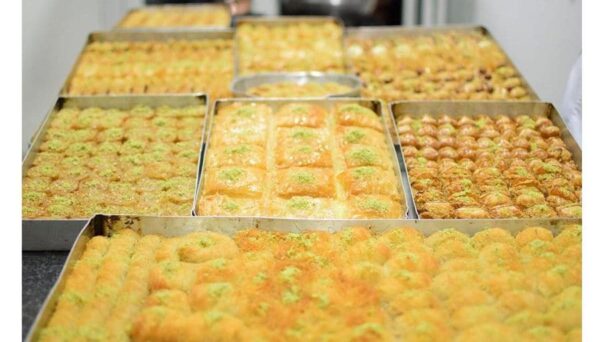Siropiasta or Pan-baked sweet
Siropiasta refers to a delightful category of Greek and Middle Eastern desserts known for their distinctive, rich, syrup-soaked quality. The word “siropiasta” stems from “siropi,” meaning syrup in Greek, and captures a diverse range of pastries that feature layers of delicate dough, nuts, spices, and sweet syrup or honey. These treats are typically served on special occasions, holidays, and family gatherings and are loved for their moist, fragrant, and flavorful experience.
Key Characteristics of Syropiasta
Siropiasta desserts are often:
- Layered and Textured: Many recipes, like baklava, feature multiple layers of phyllo dough, which give a flaky, crisp texture that contrasts beautifully with the sticky syrup.
- Nut-Filled: Finely chopped nuts—often walnuts, pistachios, or almonds—are frequently incorporated between the layers, adding both texture and flavour.
- Aromatic: These desserts are typically spiced with cinnamon, cloves, and sometimes cardamom, and the syrup might be infused with rose water, orange blossom, or lemon zest, adding an aromatic and floral complexity.
- Syrupy and Sweet: After baking, the desserts are generously drizzled or soaked in a sweet syrup made from sugar, water, honey, or a combination, allowing them to soak up the flavour and stay moist.
Popular Types of Syropiasta
- Baklava: The most famous of siropiasta, baklava is made by layering thin sheets of phyllo dough with finely chopped nuts, then baking and pouring a honey or sugar syrup over the top. Variations exist with different nuts or flavours.
- Galaktoboureko: A unique siropiasto with a creamy custard filling wrapped in layers of phyllo. After baking, it is soaked in a citrus-scented syrup, making it both rich and refreshing.
- Kataifi: This dessert features shredded phyllo dough (kataifi) wrapped around nuts, baked, and soaked in syrup. Its appearance and texture are distinct from other syropiasta because of the fine, hair-like texture of the dough.
- Portokalopita: A more modern take on traditional syropiasta, this orange-flavored syrup-soaked cake is made with crumbled phyllo dough, giving it a slightly denser, cake-like texture compared to the layered types.
- Revani: Sometimes called “ravani,” this semolina-based cake soaked in syrup. It’s usually flavoured with lemon or orange zest and sometimes has a subtle coconut or almond flavour.
How Syropiasta Are Enjoyed
Syropiasta are often enjoyed with coffee or tea and are served in small portions due to their richness. They are a favourite offering to guests and are essential to celebrations like Easter, Christmas, and weddings in Greek culture.




